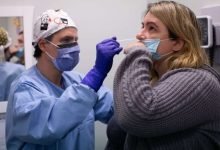More Ontario regions to enter next phase of reopening, province reports 181 new COVID-19 cases
Provincial officials announced Monday that more areas of the province will be moving into the second stage of its reopening plan this Friday.
Premier Doug Ford said as of Friday, June 19, the following areas of the province will move into stage two:
- Durham
- Hamilton
- York
- Halton
- Niagara
- Haldimand-Norfolk
- Sarnia-Lambton County
For regions in stage two, shopping malls can reopen, restaurants and bars can serve customers seated outdoors, barber shops, hair salons and tattoo parlors can operate, and swimming pools and campgrounds can reopen.
This news follows 24 other regions that were allowed to move into stage two last week, and leaves Toronto, Peel and Windsor-Essex as the sole parts of the province still in stage one.
Ford had a message for people who live in those regions, saying, “Please be patient, we can’t let our guard down.
“We’re hoping very shortly that we’ll be able to open up the other regions,” Ford said, adding that it would be “ideal” if those last three regions could be in phase two by June 26.
“I’d love to see it open by Friday,” Ford said, but it “depends on the numbers.”
Ontario on Monday reported 181 new cases of COVID-19 and that the number of patients in hospitals with the illness continues to decline, as the government gets set to announce which regions can move into the next phase of reopening.
The 0.6 per cent increase in total cases brings the cumulative total in Ontario to 32,370. Of those confirmed cases, slightly more than 84 per cent are resolved. Some 252 more cases were marked resolved on Sunday.
Nearly 70 per cent, or 126, of the additional cases are in the Toronto and Peel Region public health units. Twenty-eight of the province’s 34 public health units reported five or fewer newly confirmed infections, with 18 reported no new cases at all.
Ontario’s network of labs processed 21,751 tests yesterday, which is the fewest in five days. However, throughout the pandemic, testing levels have tended to drop considerably on weekends. There are currently 18,258 test samples waiting to be processed, meaning more than 20,000 were added to the queue since the last update.
Ford said that over a million tests have now been processed in Ontario since start of outbreak.
“Ontario’s testing is at historic levels,” Health Minister Christine Elliott said.
Meanwhile, there are now 419 people with confirmed cases of COVID-19 being treated in Ontario hospitals. That’s the fewest since April 2. There are 104 patients in intensive care units, and 69 on ventilators — eight fewer than yesterday.
Ontario’s official COVID-19 death toll grew by eight and is now 2,527. A CBC News count based on data from regional public health units puts the real toll at 2,571.
A full 78 per cent of all deaths in the province were residents in long-term care. The province is tracking outbreaks in 69 facilities, up from 67 yesterday. The number of active cases among long-term care residents also increased to 524 from 490.
Some homes that had previous outbreaks declared resolved have re-entered outbreak situations, including Pinecrest Nursing Home in Bobcaygeon, Ont., where nearly half of the residents died due to COVID-19. It had been outbreak-free since mid-May.

Pandemic pay premium issues
Ontario says it has not yet paid approximately 375,000 frontline health-care workers a promised pandemic pay premium.
A spokeswoman for Elliott’s office says the initiative is the largest of its kind in Canada and the funding will flow in “very short order.”
The government says it has provided written funding commitments to employers, and that will be followed by the flow of money.
Ford announced the premium in late April, calling it a way of recognizing the sacrifices essential workers make as they fight the spread of COVID-19.
It included a $4 hourly raise over the next four months and a monthly bonus of $250 if they work more than 100 hours in a month.
But unions representing hospital workers have said not everyone in the facilities are included, leading to low morale.
CBC








Redes Sociais - Comentários